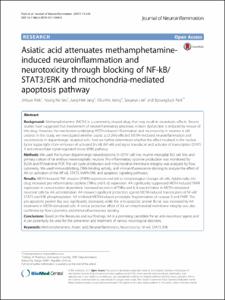Asiatic acid attenuates methamphetamine-induced neuroinflammation and neurotoxicity through blocking of NF-kB/STAT3/ERK and mitochondria-mediated apoptosis pathway
- Affiliated Author(s)
- 장정희
- Alternative Author(s)
- Jang, Jung Hee
- Journal Title
- Journal of Neuroinflammation
- ISSN
- 1742-2094
- Issued Date
- 2017
- Keyword
- Asiatic acid; ERK; Methamphetamine; NF-κB; Neuroinflammation; Neurotoxicity; STAT3
- Abstract
- BACKGROUND:
Methamphetamine (METH) is a commonly abused drug that may result in neurotoxic effects. Recent studies have suggested that involvement of neuroinflammatory processes in brain dysfunction is induced by misuse of this drug. However, the mechanism underlying METH-induced inflammation and neurotoxicity in neurons is still unclear. In this study, we investigated whether asiatic acid (AA) effected METH-mediated neuroinflammation and neurotoxicity in dopaminergic neuronal cells. And we further determined whether the effect involved in the nuclear factor kappa-light-chain-enhancer of activated B cells (NF-κB) and signal transducer and activator of transcription (STAT)3 and extracellular signal-regulated kinase (ERK) pathway.
METHODS:
We used the human dopaminergic neuroblastoma SH-SY5Y cell line, murine microglial BV2 cell line, and primary culture of rat embryo mesencephalic neurons. Pro-inflammatory cytokine production was monitored by ELISA and RT/real-time PCR. The cell cycle distribution and mitochondrial membrane integrity was analyzed by flow cytometry. We used immunoblotting, DNA-binding activity, and immunofluorescence staining to analyze the effect of AA on activation of the NF-κB, STAT3, MAPK-ERK, and apoptosis signaling pathways.
RESULTS:
METH induced TNF receptor (TNFR) expression and led to morphological changes of cells. Additionally, this drug increased pro-inflammatory cytokine (TNFα and IL-6) expression. AA significantly suppressed METH-induced TNFR expression in concentration dependent. Increased secretion of TNFα and IL-6 was inhibited in METH-stimulated neuronal cells by AA administration. AA showed significant protection against METH-induced translocation of NF-κB/STAT3 and ERK phosphorylation. AA inhibited METH-induced proteolytic fragmentation of caspase-3 and PARP. The pro-apoptotic protein Bax was significantly decreased, while the anti-apoptotic protein Bcl-xL was increased by AA treatment in METH-stimulated cells. A similar protective effect of AA on mitochondrial membrane integrity was also confirmed by flow cytometry and immunofluorescence staining.
CONCLUSIONS:
Based on the literatures and our findings, AA is a promising candidate for an anti-neurotoxic agent, and it can potentially be used for the prevention and treatment of various neurological disorders
- Department
- Dept. of Pharmacology (약리학)
- Publisher
- School of Medicine (의과대학)
- Citation
- Ji-Hyun Park et al. (2017). Asiatic acid attenuates methamphetamine-induced neuroinflammation and neurotoxicity through blocking of NF-kB/STAT3/ERK and mitochondria-mediated apoptosis pathway. Journal of Neuroinflammation, 14(1), 240–240. doi: 10.1186/s12974-017-1009-0
- Type
- Article
- ISSN
- 1742-2094
- Appears in Collections:
- 1. School of Medicine (의과대학) > Dept. of Pharmacology (약리학)
- 파일 목록
-
-
Download
 oak-2018-0130.pdf
기타 데이터 / 5.8 MB / Adobe PDF
oak-2018-0130.pdf
기타 데이터 / 5.8 MB / Adobe PDF
-
Items in Repository are protected by copyright, with all rights reserved, unless otherwise indicated.